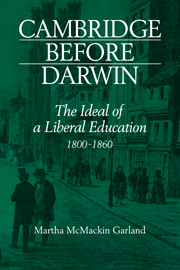Book contents
4 - Reaction against Paley and the Benthamites
Published online by Cambridge University Press: 07 October 2011
Summary
Reforms of the mathematical curriculum, admirable as they were, only touched the small number of students who were pursuing honours. Far more central to the typical undergraduate experience were the courses which made up the ordinary or ‘poll’ degree, and after about 1820 the material in this curriculum too began to come under scrutiny. Particularly carefully examined were the works that stood at the heart of the general program: the collected writings of the philosopher and natural theologian, William Paley.
Paley had been a Cambridge man himself. In some ways he was the very epitome of an eighteenth-century Cambridge scholar. Practical, unemotional, down-to-earth, he was certainly a good man and an honest divine, but by no means filled with any sort of religious enthusiasm. On the other hand he did evidence a certain political awareness and was sympathetic to the various liberal philosophies developing in England and France during the last part of the eighteenth century. He was even somewhat critical of the established forces operating within the English Church, and as a result was denied the preferment which many people thought his due. If Paley's life reflected the style of the eighteenth century, his works very nearly provided a synopsis of eighteenth-century thought. He made no pretense to be a great creative thinker, but he had a remarkable synthesizing ability. Generous in acknowledging his sources, he summed up the works of others with a style at once so attractive and so clear that his writings captured the imagination of men of his own and successive generations.
- Type
- Chapter
- Information
- Cambridge Before DarwinThe Ideal of a Liberal Education, 1800–1860, pp. 52 - 69Publisher: Cambridge University PressPrint publication year: 1980



